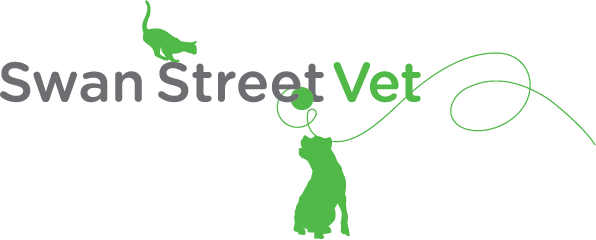Medical imaging at Swan Street Vet involves the use of various techniques to visualise and examine the internal structures of an animal’s body. These imaging methods allow our veterinarians to gain valuable insights into your pet’s health, aid in diagnosis, and assist in developing appropriate treatment plans.
Why do pets require medical imaging?
Pets may require medical imaging for various reasons, as it plays a crucial role in diagnosing and treating a wide range of conditions. Here are some common reasons why pets may need medical imaging:
- Diagnosis of injuries: Medical imaging techniques such as X-rays can help our veterinarians assess bone fractures, joint dislocations, and soft tissue injuries in pets.
- Detection of internal abnormalities: Medical imaging allows our veterinarians to visualise the internal structures of the body, including organs, blood vessels, and soft tissues. It helps in identifying abnormalities such as tumours, cysts, infections, or foreign bodies that may not be apparent during physical examination alone.
- Evaluation of organ function: Techniques like ultrasounds can provide valuable information about the structure and function of organs.
- Pre-surgical planning: Medical imaging aids our veterinarians in planning surgical procedures. It helps identify the precise location and extent of abnormalities, assisting surgeons in determining the best approach, minimising risks, and improving surgical outcomes.
- Monitoring treatment progress: Medical imaging allows our veterinarians to monitor the effectiveness of treatments over time. By comparing images taken before and after treatment, they can assess changes in the size, appearance, or response of tumours, fractures, or other conditions. This information helps adjust treatment plans as necessary.
- Screening and preventive care: In some cases, medical imaging may be used as a screening tool, especially for certain breeds predisposed to specific conditions. For example, certain dog breeds may undergo hip or elbow X-rays to evaluate the risk of developing hip dysplasia or elbow dysplasia.
Swan Street Vet’s medical imaging techniques
Here are some common medical imaging techniques used at Swan Street:
- X-rays (Radiography): X-rays utilise electromagnetic radiation to create detailed images of bones, organs, and soft tissues. They are particularly effective in detecting fractures, assessing joint health, identifying foreign objects, and evaluating the size and shape of organs. These images also provide detailed information about the extent and location of the injury, enabling accurate diagnosis and appropriate treatment planning.
- Ultrasound: Ultrasound uses sound waves to generate real-time images of organs, tissues, and blood flow. It is commonly used to examine the abdomen, heart, and reproductive organs. Ultrasound helps identify conditions such as tumours, cysts, pregnancy, abnormalities in organ structure, liver disease, urinary tract issues, gastrointestinal disorders, and more.
These medical imaging techniques provide valuable information to our veterinarians, enabling them to make accurate diagnoses, plan treatments, and monitor the progress of various conditions in pets. The specific imaging method used depends on factors such as the suspected condition, the area of interest, availability, and the specific needs of the individual pet.
Our dental X-ray machine
A dental X-ray machine for pets is a specialised piece of equipment used in veterinary dentistry to capture detailed images of a pet’s teeth, jawbones, and surrounding structures. It is specifically designed to provide valuable diagnostic information that may not be visible through a regular dental examination alone.
Here are some key features and uses of our dental X-ray machine:
- Small size and portability: Swan Street’s dental X-ray machine is compact and portable. This allows our veterinarians to easily manoeuvre and position the machine within the dental clinic or operating room.
- Digital imaging: Modern dental X-ray machines for pets utilise digital radiography technology. This means that the images are captured electronically and can be viewed and analysed on a computer screen. Digital imaging offers advantages such as instant image acquisition, image enhancement capabilities, and the ability to store and share images electronically.
- Dental X-ray sensors: The X-ray machine is used in conjunction with dental X-ray sensors that are specifically designed for use in a pet’s mouth. These sensors are smaller and more flexible than those used in human dentistry, making them more comfortable for pets during the X-ray procedure.
- Diagnostic capabilities: Dental X-rays for pets help our veterinarians assess the overall oral health of an animal, including the condition of individual teeth, roots, and surrounding bone structures. They can detect hidden dental problems such as tooth fractures, tooth root infections, periodontal disease, impacted teeth, jaw abnormalities, and oral tumours.
- Treatment planning and monitoring: Dental X-rays assist our veterinarians in creating effective treatment plans for dental procedures. They provide a clear view of the pet’s oral anatomy, allowing for accurate treatment of specific dental issues. Additionally, dental X-rays are useful for monitoring the progress of dental treatments or evaluating the success of previous interventions.
- Reduced radiation exposure: Veterinary dental X-ray machines are designed to minimise radiation exposure for both the pet and the veterinary staff. Lead aprons, collars, and shields are typically used to protect other areas of the pet’s body during the X-ray procedure.
Dental X-ray machines are an essential tool in veterinary dentistry, enabling our veterinarians to provide thorough dental care and improve the overall oral health of pets. By capturing detailed images, dental X-rays help in diagnosing and treating dental conditions, leading to better oral hygiene and overall well-being for animals.
If you have concerns about your pet’s health, don’t hesitate to contact Swan Street Vet and schedule an appointment today. Our dedicated team is here to assist you and address any worries you may have. Reach us at (03)9111 0000 to book your appointment and prioritize your pet’s well-being.

